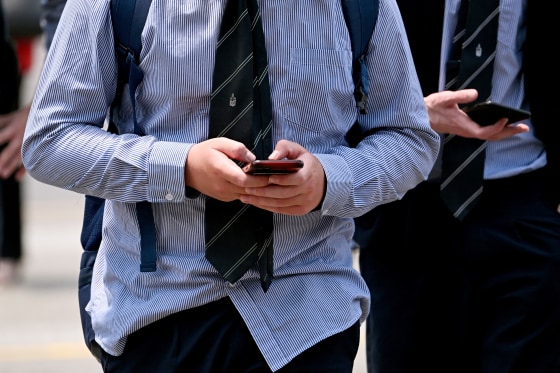
Australia’s SydneyAustralia took a step closer to barring children under 16 from using social media on Wednesday when a measure was passed by the lower house of Parliament, despite pressure from Alphabet’s Google and Facebook owners to postpone the law.
After Prime Minister Anthony Albanese’s center-left Labor government garnered bipartisan support for the ban, the Australian House of Representatives passed the bill 102 votes to 13, establishing some of the strictest social media regulations in the world.
The government is eager to get the bill enacted before Thursday, the end of the parliamentary year, and the Senate was scheduled to discuss it later on Wednesday.
In an attempt to increase his popularity ratings before the May election, Albanese has claimed that children’s physical and mental health are at risk from excessive social media use and is seeking parental support.
Social media companies would be required by the proposed law to take reasonable measures to guarantee that age-verification safeguards are in place. Systemic violations could result in fines for businesses of up to 49.5 million Australian dollars ($32 million).
To implement the restriction, Australia intends to test an age-verification system that would include official identity or biometrics.
This week, a Senate committee supported the law, but added a clause stating that social media companies should not require users to provide personal information, like a passport or other kind of digital identification, in order to verify their age.
The committee also stated that while drafting legislation, the government ought to actively involve young people.
According to Sen. Karen Grogan, the committee’s head, “when an age restriction is implemented, young people, and in particular diverse cohorts, must be at the center of the conversation to ensure there are constructive pathways for connection.”
Google and Meta argued in submissions to Parliament that the ban should be postponed until the conclusion of the age-verification trial, which is anticipated to occur in the middle of 2025. Elon Musk’s X claimed the proposed rule might violate children’s human rights, while ByteDance’s TikTok stated that additional consultation was necessary.
Parents of children who had self-harmed as a result of cyberbullying testified during an emotionally charged parliamentary investigation into social media, which was when the ban was first announced.
It has sparked intense discussion, with parent organizations claiming that children under the age of sixteen are too young to use the internet and youth advocates claiming it denies youngsters a voice.
Teens have argued that a ban is not the answer and that the rule may cut them off from their most significant family and social ties.
Enie Lam, 16, a high school student in Sydney, stated, “I understand that using social media a lot is not a good thing and I’m working on it.”
However, she stated such a ban would not be effective.
On the grounds of civil liberties and privacy, Albanese’s party, which does not control the Senate, has failed to win over the left-leaning Greens and several far-right members, despite gaining vital backing from the opposition conservatives for the bill.
In a rare move in Australian politics, a conservative lower house member split with the party and voted against the measure on Wednesday. Two conservative senators also declared they would vote against the bill, believing it should be postponed until the age-verification trial is finished.
Even the independent statutory body, the Australian Human Rights Commission, opposed the prohibition, claiming it infringed on children’s rights to participate in society and express themselves.
However, surveys indicate that the public is largely in favor of the change. According to a YouGov poll last week, 77% of Australians supported the ban, up from 61% in August.
The restriction is also supported by Australian media, including Rupert Murdoch’s News Corp. and the publicly owned Australian Broadcasting Corp. Under the slogan “Let Them Be Kids,” News Corp., the largest newspaper publisher in the nation, launched an editorial campaign advocating for the ban.
Jenny Branch-Allen, president of the advocacy group Australian Parents Council, stated that her members believe this to be one of the most significant issues affecting them and their families at the moment.
Large corporations must begin to assume accountability. Let’s make an effort to lessen the events between social media and Australian youth.
Note: Every piece of content is rigorously reviewed by our team of experienced writers and editors to ensure its accuracy. Our writers use credible sources and adhere to strict fact-checking protocols to verify all claims and data before publication. If an error is identified, we promptly correct it and strive for transparency in all updates, feel free to reach out to us via email. We appreciate your trust and support!
